河南省鹿邑县高中联考2018-2019学年英语(含五份模拟)高二下学期期末模拟试卷
2018_2019学年高二英语下学期期末考试试题201912120315

2018-2019学年高二英语下学期期末考试试题试卷满分:150分考试时间:120分钟第一卷(选择题共 100分)第一部分听力 (共两节,满分 20 分)听下面5段对话。
每段对话后有一个小题,从题中所给的A、B、C三个选项中选出最佳选项,并标在试卷的相应位置。
听完每段对话后,你都有10秒钟的时间来回答有关小题和阅读下一小题。
每段对话仅读一遍。
1·What does the man always do on Saturday?A. See a film.B. Have a class.C. Review his notes.2. How does the woman deal with difficult lectures?A. By recording them.B. By talking with lecturers.C. By attending them again.3. Where will the man fetch his notebook?A. In the library.B. In the classroom.C. In the teachers' office.4.What kind of music does the man often listen to?A. Jazz music.B. Classical music.C. Rock music.5. What are the speakers mainly talking about?A. Sarah's happy retirement.B. The man's art classes.C. Their hobbies.第二节听下面5段对话或独白。
每段对话或独白后有几个小题,从题中所给的A、B、C 三个选项中选出最佳选项,并标在试卷的相应位置。
听每段对话或独白前,你将有时间阅读各个小题, 每小题5秒钟;听完后,各小题将给出5秒钟的作答时间。
2018-2019学年高二英语12月联考试题

2018-2019学年高二英语12月联考试题本试卷由试题卷和答题卡两部分组成。
试卷分四个部分。
所有试题均须在答题卡上作答。
第一部分听力 (共两节,满分30分)第一节 (共5小题;每小题1.5分,满分7.5分)听下面5段对话。
每段对话后都有一个小题。
从题中所给的A、B、C三个选项中选出最佳选项。
听完每段对话后,你都有10秒钟的时间来回答有关小题和阅读下小题。
每段对话仅读一遍。
1.What’s the probable relationship between the two speakers?A.Driver and passenger.B. Teacher and student.C. Classmates.2. Why can’t the man help the woman?A. He must leave at once.B. He’s too busy to help her.C. He doesn’t know how to help her.3. What will the woman probably do this evening?A. She will attend the wedding.B. She will go over the lessons.C. She willeat out.4. What does the man imply?A. Karen is very forgetful.B. He knows Karen better now.C. Karen is sure to pass the interview.5. What are the speakers doing?A. Riding a horse.B. Shooting a movie.C. Taking aphoto.听下面5段对话或独白。
每段对话或独白后有几个小题,从题中所给的A、B、C三个选项中选出最佳选项,并标在试卷的相应位置。
人教版2018-2019学年第二学期高二期末考试英语试卷
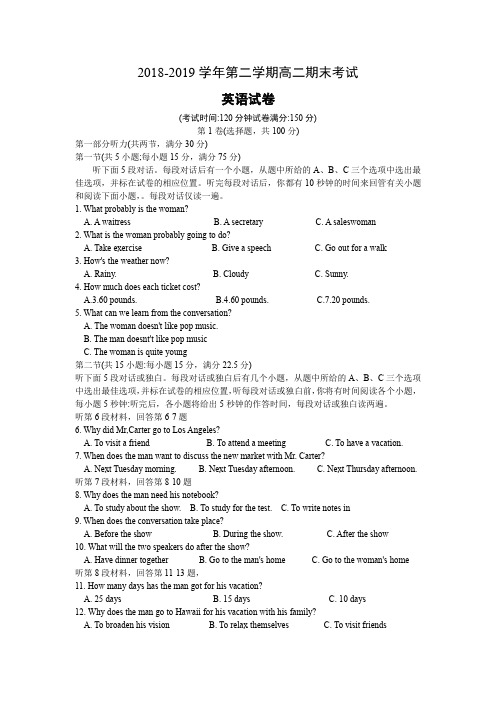
2018-2019学年第二学期高二期末考试英语试卷(考试时间:120分钟试卷满分:150分)第1卷(选择题,共100分)第一部分听力(共两节,满分30分)第一节(共5小题;每小题15分,满分75分)听下面5段对话。
每段对话后有一个小题,从题中所给的A、B、C三个选项中选出最佳选项,并标在试卷的相应位置。
听完每段对话后,你都有10秒钟的时间来回管有关小题和阅读下面小题,。
每段对话仅读一遍。
1. What probably is the woman?A. A waitressB. A secretaryC. A saleswoman2. What is the woman probably going to do?A. Take exerciseB. Give a speechC. Go out for a walk3. How's the weather now?A. Rainy.B. CloudyC. Sunny.4. How much does each ticket cost?A.3.60 pounds.B.4.60 pounds.C.7.20 pounds.5. What can we learn from the conversation?A. The woman doesn't like pop music.B. The man doesnt't like pop musicC. The woman is quite young第二节(共15小题:每小题15分,满分22.5分)听下面5段对话或独白。
每段对话或独白后有几个小题,从题中所给的A、B、C三个选项中选出最佳选项,并标在试卷的相应位置,听每段对话或独白前,你将有时间阅读各个小题,每小题5秒钟:听完后,各小题将给出5秒钟的作答时间,每段对话或独白读两遍。
听第6段材料,回答第6-7题6. Why did Mr,Carter go to Los Angeles?A. To visit a friendB. To attend a meetingC. To have a vacation.7. When does the man want to discuss the new market with Mr. Carter?A. Next Tuesday morning.B. Next Tuesday afternoon.C. Next Thursday afternoon. 听第7段材料,回答第8-10题8. Why does the man need his notebook?A. To study about the show.B. To study for the test.C. To write notes in9. When does the conversation take place?A. Before the showB. During the show.C. After the show10. What will the two speakers do after the show?A. Have dinner togetherB. Go to the man's homeC. Go to the woman's home 听第8段材料,回答第11-13题,11. How many days has the man got for his vacation?A. 25 daysB. 15 daysC. 10 days12. Why does the man go to Hawaii for his vacation with his family?A. To broaden his visionB. To relax themselvesC. To visit friends13. Where is the woman going this summer?A. EgyptB. Canada.C. The United States听第9段材料,回答第14-17题14. When did the fight happen?A. At 7B. At 11C. At 1215. What did the young man take?A. A clockB. A mobile phoneC. A shelf16. Who was injured in the fight?A. A young manB. The womanC. The shopkeeper.17. What does the man want to do now?A. Look for the young man.B. Go shopping.C. Help the woman.听第10段材料,回答第18-20题。
学2018-2019学年高二英语下学期期末考试试题_2
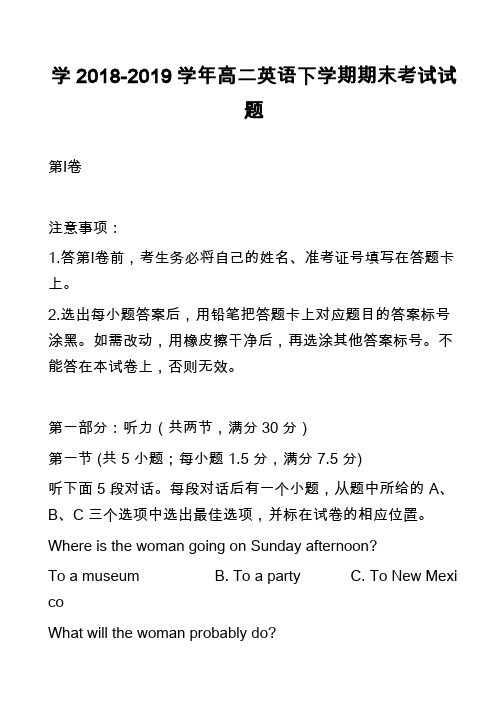
学2018-2019学年高二英语下学期期末考试试题第Ⅰ卷注意事项:1.答第Ⅰ卷前,考生务必将自己的姓名、准考证号填写在答题卡上。
2.选出每小题答案后,用铅笔把答题卡上对应题目的答案标号涂黑。
如需改动,用橡皮擦干净后,再选涂其他答案标号。
不能答在本试卷上,否则无效。
第一部分:听力(共两节,满分30分)第一节 (共 5 小题;每小题 1.5 分,满分 7.5 分)听下面 5 段对话。
每段对话后有一个小题,从题中所给的 A、B、C 三个选项中选出最佳选项,并标在试卷的相应位置。
Where is the woman going on Sunday afternoon?To a museum B. To a party C. To New Mexi coWhat will the woman probably do?See the manager immediatelyArrange to meet the managerC. Wait for the manager to arriveHow much will the boy pay if he wants to buy a new bike?25 dollars B. 50 dollars C. 90 dollars Where should the man be on Wednesday?At a theatre B. At a meeting C. At the office What is the probable relationship between the speakers? Strangers B. Colleagues C. Friends第二节(共15小题;每小题1.5分,满分22.5分)听第6段材料,回答第6、7题。
Why did Linda go to London?To take a holiday. B. To see a doctor. C. To han dle work.What are the speakers going to do tonight?Leave for London. B. Eat out with a friend C. Go to the manager’s office听第7段材料,回答第8、9题。
学2018-2019学年高二英语下学期期末考试试题_4
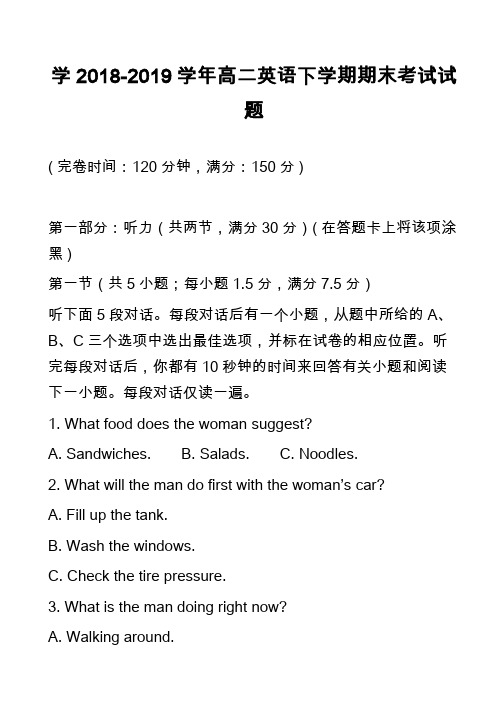
学2018-2019学年高二英语下学期期末考试试题( 完卷时间:120分钟,满分:150分 )第一部分:听力(共两节,满分30分)( 在答题卡上将该项涂黑 )第一节(共5小题;每小题1.5分,满分7.5分)听下面5段对话。
每段对话后有一个小题,从题中所给的A、B、C三个选项中选出最佳选项,并标在试卷的相应位置。
听完每段对话后,你都有10秒钟的时间来回答有关小题和阅读下一小题。
每段对话仅读一遍。
1. What food does the woman suggest?A. Sandwiches.B. Salads.C. Noodles.2. What will the man do first with the woman’s car?A. Fill up the tank.B. Wash the windows.C. Check the tire pressure.3. What is the man doing right now?A. Walking around.B. Watching TV.C. Eating snacks.4. Where is the conversation probably taking place?A. In an office.B. In a hospital.C. In a restaurant.5. What are the speakers mainly talking about?A. Different colors.B. A picture.C. Some flowers.第二节(共15小题;每小题1.5分,满分22.5分)听下面5段对话或独白。
每段对话或独白后有几个小题,从题中所给的A、B、C三个选项中选出最佳选项,并标在试卷的相应位置。
听完每段对话或独白前,你将有时间阅读各个小题,每小题5秒钟;听完后,各小题将给出5秒钟的做答时间。
每段对话或独白读两遍。
2018_2019学年高二英语下学期期末考试试题(含解析) (3)

2018—2019学年度下学期期末质量检测高二英语(考试时间:120分钟试卷满分:150分试卷共10页)第一部分听力(共两节,满分30分)做题时,先将答案标在试卷上。
录音内容结束后,你将有两分钟的时间将试卷上的答案转涂到答题卡上。
第一节(共5小题;每小题1.5分,满分7.5分)听下面5段对话。
每段对话后有一个小题,从题中所给的A、B、C三个选项中选出最佳选项,并标在试卷的相应位置。
听完每段对话后,你都有10秒钟的时间来回答有关小题和阅读下一小题。
每段对话仅读一遍。
1.What does the woman want to do?A. Mail a letter.B. Use the restroom.C. Find the police station.【答案】B【解析】【分析】W: Can you tell me where the nearest public bathroom is, please?M: Actually, I’m looking for one myself! Maybe we should ask that policeman over th ere in front of the post office. I’m sure he’d know.【详解】此题为听力题,解析略。
2.What will the man do first?A. Go to New York.B. Meet the woman.C. Visit Washington,D.C.【答案】A【解析】【分析】W: If I go to Washington, D.C., will you meet me there?M: I have to go to New York. But if I have time, I’ll meet you there on Friday.【详解】此题为听力题,解析略。
3.What is the relationship between the woman and Dr. Philips?A. Hostess and gardener.B. Neighbors.C. Doctor and patient.【答案】B【解析】【分析】M: Who is that guy cutting the grass across the street?W: That’s Dr. Philips. He just moved in to the Hendersons’ old house last weekend. You should go over there and introduce yourself.M: Good idea. I could always use a new friend.【详解】此题为听力题,解析略。
2018-2019学年河南省名校联盟高二下期期末模拟试题——英语(Word版)
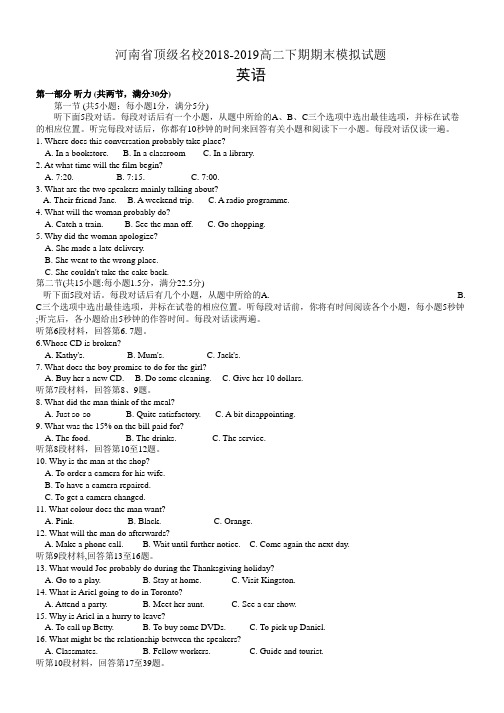
河南省顶级名校2018-2019高二下期期末模拟试题英语第一部分听力 (共两节,满分30分)第一节 (共5小题;每小题1分,满分5分)听下面5段对话。
每段对话后有一个小题,从题中所给的A、B、C三个选项中选出最佳选项,并标在试卷的相应位置。
听完每段对话后,你都有10秒钟的时间来回答有关小题和阅读下一小题。
每段对话仅读一遍。
1. Where does this conversation probably take place?A. In a bookstore.B. In a classroomC. In a library.2. At what time will the film begin?A. 7:20.B. 7:15.C. 7:00.3. What are the two speakers mainly talking about?A. Their friend Jane.B. A weekend trip.C. A radio programme.4. What will the woman probably do?A. Catch a train.B. See the man off.C. Go shopping.5. Why did the woman apologize?A. She made a late delivery.B. She went to the wrong place.C. She couldn't take the cake back.第二节(共15小题:每小题1.5分,满分22.5分)听下面5段对话。
每段对话后有几个小题,从题中所给的A. B. C三个选项中选出最佳选项,并标在试卷的相应位置。
听每段对话前,你将有时间阅读各个小题,每小题5秒钟;听完后,各小题给出5秒钟的作答时间。
每段对话读两遍。
听第6段材料,回答第6. 7题。
6.Whose CD is broken?A. Kathy's.B. Mum's.C. Jack's.7. What does the boy promise to do for the girl?A. Buy her a new CD.B. Do some cleaning.C. Give her 10 dollars.听第7段材料,回答第8、9题。
学2018-2019学年高二英语下学期期末考试试题_7
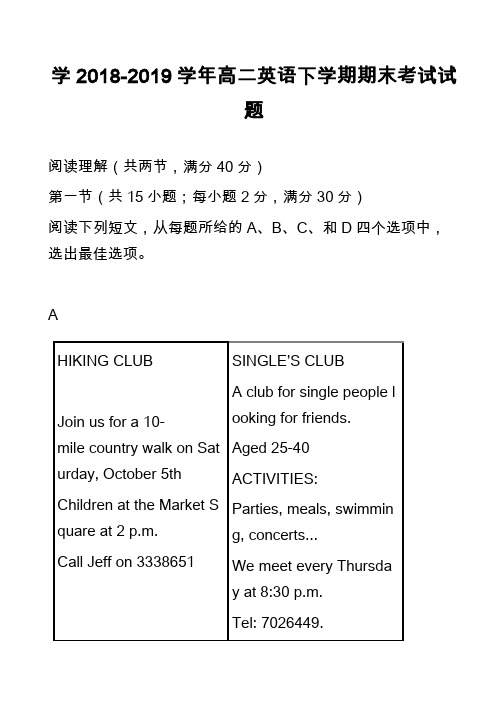
学2018-2019学年高二英语下学期期末考试试题阅读理解(共两节,满分40分)第一节(共15小题;每小题2分,满分30分)阅读下列短文,从每题所给的A、B、C、和D四个选项中,选出最佳选项。
AHIKING CLUBJoin us for a 10-mile country walk on Sat urday, October 5th Children at the Market S quare at 2 p.m.Call Jeff on 3338651SINGLE’S CLUBA club for single people l ooking for friends.Aged 25-40 ACTIVITIES:Parties, meals, swimmin g, concerts...We meet every Thursda y at 8:30 p.m.Tel: 7026449.E-mail: singleclub@yahoo. comSUMMER JOBDo you like to talk with p eople?Do you like to write stori es?Do you want to work for a magazine?Then come and work for us as a reporter.Please call Karen at 555 8823.WANTEDA 2-bedroom house in the cit y center.Under £ 800 a month Call Tony at 3802692Mr Green wants to go hiking with his children. They should m eet at the Market Square_____________A. at 8:30 a.m on October 5th .B. on Saturday morning.C. At 2 p.m on October 5th .D. on Sunday morning. Tony needs a house _____________.A. in the countrysideB. near the stationC. in the city centerD. next to the schoolWho can join the Singles’ Club ?____________.A. A 10-year-old boyB. A married woman of 25C. Young parentsD. A 28-year-old single manAlice wants to practice writing stories in her summer holiday. She had better__________ for more information.A. send an e-mail to Singles’ clubB. join the Hiking ClubC. make a phone call to KarenD. call Tony at 3338651BIn Europe many people died during the Second World War. A s a result, at the end of the war there were many orphans (孤儿) there. A man called Hermann Gmeiner wanted to help the se children. His idea was simple. He wanted orphans to have a home, and he wanted them to have the care and kindness o f parents. Gmeiner asked people to give him some money. Wi th this money he built the first SOS Children’s Village at Imst, i n Austria. It opened in1949. This is how the SOS stand for “S ave Our Souls(灵魂).” This means, “Pl ease help us!” An SOS Children’ village gives help to orphans. Hermann Gmeiner’s idea for helping o rphans soon spread(传播)all over the world. By 1983 there were 170 SOS Children’s Vill ages in the world. People in many countries give money to hel p the villages.Today the children from the first village have grown up. Now s ome of them work in other SOS Children’s Villages. In SOS Vi llages orphans live in family groups. There are several houses in each village. The biggest village has 40 or 50 houses! Bet ween seven and ten children live in a house. A woman lives w ith each group of children and looks after them. She gives the children a lot of love and kindness. She cooks meals for them and makes comfortable, happy home for them.Of course, the children don’t spend all their time in the village. They go to school; they go out with their friends. But the villa ge gives them a home—sometimes for the first time in their lives.. The SOS Children’s Villages are built for________ first.A. the children who are poorB. the orphans in EuropeC. the kind womenD. people who died in the war.We can conclude from the article that the money for helping t he SOS Villages mainly comes from______.A. governmentsB. special organizationC. people in different countriesD. the orphans themselvesWhich of the following is NOT the work a woman in an SOS V illage does for each group of children?A. She lives with the children and looks after them.B. She gives the children a lot of love and kindness.C. She cooks meals for children.D. She teaches the children how to use the computer.CAbout 97% of the world’s water is salty and is found in our oceans and seas. But, as we can’t drink seawater, how can it be important?Every part of our seas and oceans contains an amazing num ber of animals and fish that live at different ocean depths. Mo st of the different species of animals and fish depend on simpl e plants for their food. These simple plants called algae (海藻) drift near the surface of the ocean and use sunlight to turn carbon dioxide and water into food and oxygen. In fact, algae produce over half of the oxygen people breathe. How importa nt seawater is!Each plant or animal in our seas and oceans is an important link in a food chain. The algae are eaten in large amounts by microscopic animals, which are in turn consumed by larger an imals. These food chains are delicately balanced.The bad news about the food chains in the oceans is that they are under threat because of man. People once thought tha t the oceans were so big that it didn’t matter if we dumped rub bish into them or caught huge quantities of fish and whales for food. But we now know this is not true and fish stocks (储备) in the oceans have started to drop.Thankfully, the world is taking steps to protect the future of o ur oceans by introducing international agreements to protect marine habitats. Most countries have introduced fishing restric tions to protect fish stocks in the oceans and new techniques are being pioneered to cope with pollution. Finally, the import ance of protecting oceans is being made known to more peop le. This is just the beginning of a long process to protect the o ceans for our future. We depend on the oceans for fish which are an important part of the human diet. How important seawa ter is!People used to think that the rubbish thrown into the sea ____ ____.A. wouldn’t harm the fish in the seaB. would change the balance of the food chainC. would be broken down in the seaD. wouldn’t do much harm to the seaFrom the passage, we learn that _________.A. most fish and sea animals live at the surface of the seasB. it is very difficult to break the balance of a food chainC. excessive fishing has caused the decrease in fish stockD. it won’t be long before the problems concerning oceans will be solvedWhich of the following is NOT a way being used to protect oc eans?A. The use of international agreements.B. Forbidding fishing to protect fish stocks.C. The use of new techniques.D. Raising people’s awareness of the need to protect oceans. What would be the best title of the passage?A. The importance of seawater.B. Life in the oceans.C. How to protect food chains.D. How to deal with seawater pollution.DMusic is magic! Music speaks louder than words and it is a “la nguage” that the whole world can understand. A piece of musi c can produce a response in the heart and mind. Like feeling an electrical current or receiving a personal radio signal, musi c has a spiritual effect on a person. Different kinds of music in fluence people in different ways.I have listened to music all my life. When I was twelve years o ld, the Beatles came to America and my whole world opened up. Maybe young people today cannot understand the influen ce of the Beatles when they exploded across America. Their i nfluence changed the way we dressed, looked, acted and spo ke... even our culture. The Beatles arrived in America from th e UK just three months after the assassination(暗杀) of President John Kennedy, which had put America into a great depression. And the freshness and lively spirit of the Be atles was exactly what the country needed to refresh itself. Music links the heart of the hearer with that of the composer. This means that it mixes the spirit of the composer with your s pirit when you listen to it. And the music can take your spirit o ut of your body and transport you into another world. Music ha s a great way of touching people. Music can make you laugh, cry or shout. Itˈs also a great source of inspiration.Try this one day and notice what happens: make yourself a cu p of tea, sit on your sofa and play one of your favorite songs. Close your eyes, and soon youˈll find yourself creating vivid m ental images-matching the music that you are listening to. Music has magical power because it ________.A. is a kind of languageB. can be played much louder than wordsC. receives a personal radio signalD. can influence a personˈs spiritWhat can we learn about the Beatles from the passage?A. They were the biggest band in American history.B. They are not accepted by modern American people.C. They appeared at a special time in American politics.D. They represented the roots of American culture.Music influences people in the following ways except _______ ____.A. connecting the listener and the composer mentallyB. transporting people from one place to anotherC. allowing people to express their emotionsD. touching and inspiring peopleWhat does the writer suggest people do in the last paragraph ?Relax and listen to their favorite music.B. Enjoy drinking in spare time.C. Create vivid pictures.D. Notice everything happening around.第二节(共5小题;每小题2分,满分10分)根据短文内容,从短文后的选项中选出能填入空白处的最佳选项。
普通高中联合体2018-2019学年高二英语下学期期末联考试题
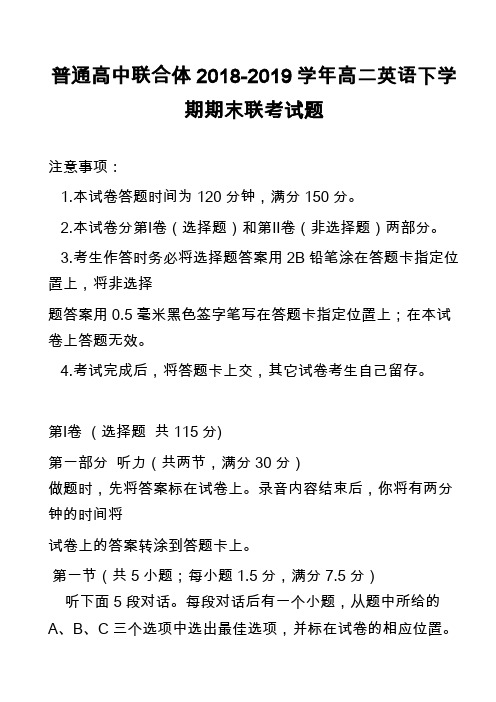
普通高中联合体2018-2019学年高二英语下学期期末联考试题注意事项:1.本试卷答题时间为120分钟,满分150分。
2.本试卷分第Ⅰ卷(选择题)和第Ⅱ卷(非选择题)两部分。
3.考生作答时务必将选择题答案用2B铅笔涂在答题卡指定位置上,将非选择题答案用0.5毫米黑色签字笔写在答题卡指定位置上;在本试卷上答题无效。
4.考试完成后,将答题卡上交,其它试卷考生自己留存。
第Ⅰ卷(选择题共115分)第一部分听力(共两节,满分30分)做题时,先将答案标在试卷上。
录音内容结束后,你将有两分钟的时间将试卷上的答案转涂到答题卡上。
第一节(共5小题;每小题1.5分,满分7.5分)听下面5段对话。
每段对话后有一个小题,从题中所给的A、B、C三个选项中选出最佳选项,并标在试卷的相应位置。
听完每段对话后,你都有10分钟的时间来回答有关小题和阅读下一小题。
每段对话仅读一遍。
1. When should Jane go to see Professor White?A. At 9:00B. At 10:00C. At 11:002. What did Eva do this afternoon?A. She had an English class.B. She had a history class.C. She didn’t have any class.3. What does the man mean?A. The woman should stay at home.B. The woman should go to the library.C. The woman should tell her neighbor to stop making noise.4. Which T-shirt would the woman like to buy?A. The green oneB. The red oneC. The white on e5. Where is the woman now?A. In New YorkB. In ChicagoC. In California第二节听下面5段对话或独白。
- 1、下载文档前请自行甄别文档内容的完整性,平台不提供额外的编辑、内容补充、找答案等附加服务。
- 2、"仅部分预览"的文档,不可在线预览部分如存在完整性等问题,可反馈申请退款(可完整预览的文档不适用该条件!)。
- 3、如文档侵犯您的权益,请联系客服反馈,我们会尽快为您处理(人工客服工作时间:9:00-18:30)。
河南省鹿邑县高中联考2018-2019学年英语高二下学期期末模拟试卷第二部分阅读理解(共两节,满分40分)第一节(共15小题;每小题2分,满分30分)阅读下列短文,从每题所给的四个选项(A、B、C和D)中,选出最佳选项,并在答题卡上将该项涂黑。
AExploit your parking spaceAn unused parking space or garage can make money. If you live near a city center or an airport, you could make anything up to £200 or £300 a week. Put an advertisement for free on Letpark or Atmyhousepark.Rent(出租)a roomSpare room Not only will a lodger(房客)earn you an ine, but also, thanks to the government-backed “rent a room” program, you won’t ha ve to pay any tax on the first £4500 you make per year. Try advertising your room on Roomspare or Roommateeasy.Make money during special eventsDon’t want a full-time lodger? Then rent on a short-term basis. If you live in the capital, renting a room out during the Olympics or other big events could bring in money. Grashpadder can advertise your space.Live on setRenting your home out as a “film set” could earn you hundreds of pounds a day, depending on the film production pany and how long your home is needed. A quick search on the Internet will bring up dozens of online panies that allow you to register your home for free—but you will be charged if your home gets picked.Use your roofYou need the right kind of roof, but some energy panies pay the cost of fixing solar equipment (around £14,000), and let you use the energy produced for nothing. In return, they get paid for unused energy fed back into the National Grid. However, you have to sign a 25-year agreement with the supplier, which could prevent you from changing the roof.21. If you earn £5000 from renting a room in one year, the tax you need to pay will be based on ______.A. £800B. £500C. £4500D. £500022. Where can you put an advertisement to rent out a room during a big event?A. On Letpark.B. On Roomspare.C. On Grashpadder.D. On Roommateeasy.23. If you want to use energy free, you have to_____.A. sign an agreement with the governmentB. pay around £14,000 for the equipmentC. sell the roof to some energy paniesD. keep the roof unchanged for within 25 yearsBAt a meeting, a well-known speaker lifted up a bill of 20 dollars before starting his speech.Facing 200 people, he asked, “Who wants this 20-do llar bill?” A great many hands were put up. Then he continued to say, “I intended to give it to any one of you, but allow me to do a thing before giving it to you.” Suddenly he crumpled(揉)it into a round mass. Then he asked, “Who wants it? ” Still some han ds were lifted up.He asked again, “Well, how could it be if I do it like this?” he threw the bill onto the ground, stepped on it and twisted it. As he picked it up, the bill had bee not only dirty but wrinkled.“Who still wants it?” Still a few people put up their hands.“My dear friends, you have had a meaningful class. No matter how I treated this bill, you still want it, because it is worth 20 dollars. On your life road, you may be knocked down or even broken into pieces by your determination or unfavorable situations. We may feel ourselves worth nothing, but, my darling, remember that whatever happens in the future, you should never lose your value in the God’s heart. You’re particular ---- never forget it.”24. How many times did the speaker ask the people whether they wanted the bill?A. OnceB. TwiceC. Three timesD. Four times25. The underlined word “wrinkled” in the third paragraph probably means _______.A. brokenB. having small lines or folds in itC. flatD. having holes on it26. The speaker did this test in order to _____________.A. tell the audience that one should never lose one’s own valueB. tell the audience that God values money mostC. test if some of the audience were extremely interested in moneyD. play a trick on the audience27. What would the speaker probably talk about next?A. How money can make people crazy.B. How to avoid being knocked down in one’s life.C. How to keep one’s value of life.D. How to give a meaningful class.CFrom a very early age, some children exhibit better self-control than others.Now, a new study that began with about 1,000 children in New Zealand has tracked how a child’s low self-control can predict poor health, money troubles and even a criminal record in their adult years.Researchers have been studying this group of children for decades now.They observed the level of self-control the youngsters displayed.Parents,teachers, even the kids themselves scored the youngsters on measures like “acting before thinking” and “Persistence in reaching goals.”The study led by Moffitt of Duke University and colleagues followed 1,000 children from birth to age 32 in Dunedin New Zealand.“The children who had the lowest self-control when they were age three to ten, later on had the most health problems in their 30s,” Moffitt said, “and they had the worst financial situation. They were more likely to have a criminal record and to be raising a child as a single parent on a very low ine.”Moffitt explained that self-control problems were widely observed, and weren’t just a feature of a small grou p of misbehaving kids.Moffitt said it’s still unclear why some children have better self-control than others, though she said other researchers have found that it’s mostly a learned behavior, with relatively little genetic influence.But good self-control can be set to run in families, because children with good self-control are more likely to grow up to be healthy and prosperous parents.But the good news,Moffitt said is that self-control can be taught by parents and through school curricula that have been shown to be effective.28. From the first two paragraphs we learn that ________.A. the research has been carried out for five yearsB. self-control in kids tends to determine their futureC. self-control was assessed by children’s intelligenceD. childre n’s self-control is almost the same at early age29.Children with low self-control are more likely to ________.A. bee wealthy in later lifeB. get good school performanceC. have better financial planningD. adopt negative behaviors30. According to Moffitt, ________.A. only good genetic factors can shape their lives in the futureB. scientists know well why some children have better self-controlC. self-control in childhood has nothing to do with criminal activityD. will-power as a child r eally influences people’s chances of adulthood31. What can be inferred from the passage?A. Self-control cannot be taught in schools.B. The study is restricted within few participants.C. It’s never too late to deal with self-control problems.D. Good parenting can improve self-control and life success.DMany of us may be eating food containing GM(转基因的) ingredients without realizing it. Are GM foods safe for people? Can they help solve the poverty problem? They have been the subjects of a hot debate.This debate is related to increasing challenges from rising climatic change, population growth, urbanization, and natural resource consumption. According to the Food and Agriculture Organization, food production needs to increase by 60 percent by 2050 in order to feed 9 billion people. Scientists and policymakers are searching for effective ways to gain nutritious food, for today and future. Unlike previous agricultural methods (such as the Green Revolution), GM crops are to fight food safety and poverty challenges.The great expansion of GM crop varieties over the last two decades can be seen easily. The total area devoted to GM crops has increased 100 times from 1.7 million hectares in 1996 to 170 million hectares in 2018. Developing countries now grow more GM crops than developed countries (in terms of area), largely driven by Brazil’s rapid adoption of GM crops. China is home to about 4 percent of the total global area devoted to GM crops. Beans, corn, and cotton are main global GM crops, while China’s focus is on cotton, papaya, and poplar.Recently, a scientific study shows that GM crops are safe for people and the environment. According to a 2018 report on the safety of GM crops by the EU, “the main conclusion to be drawn from the efforts of more than 130 research projects, covering a period of more than 25 years of research, and involving more than 500 research groups, is that biology methods, are not more risky than traditional planting technologies, for example.” Other international and nationa l scientific bodies, such as the World Health Organization, have reached the same conclusion.32. As for GM crops, what do people mainly focus on ?A. Food production.B. Food nutrition.C. Food safety.D. Food variety.33. What does Paragraph 3 talk about?A. More GM crops in developing countries.B. Less GM crops in developed countries.C. Rapid adoption of GM crops in Brazil.D. The expansion of GM crop varieties of the world.34. From a recent scientific study, we can infer that______.A. traditional planting technologies are more riskyB. the safety of GM crops has been proved in many waysC. the safety of GM crops was reported by the EU in 2018D. present GM crops are safe for people and the environment35. What’s the writer’s attitude towards GM crops?A. Supportive.B. Opposed.C. Unknown.D. Indifferent.第二节 (共5小题; 每小题2分,满分10分)根据短文内容,从短文后的选项中选出能填入空白处的最佳选项。
